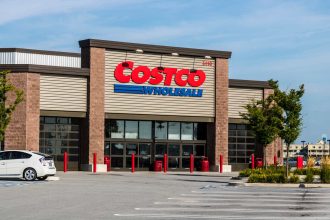Another day, another food recall—at least, that’s how it feels. With food safety alerts becoming a regular fixture in the news cycle, consumers are paying closer attention to what’s being pulled from store shelves. This time, it’s millions of grocery store donuts—but this recall raises a bigger question: When food is sold under private-label brands, how do consumers know if they’re affected?
The recall of over 2 million donuts due to potential Listeria contamination isn’t just about one brand. It highlights how private-label food production distances consumers from the companies behind their food—and why tracking food recallsisn’t always as simple as checking a familiar brand name.
What’s the Recall?
More than 2 million donut products have been recalled across the U.S. and Canada due to potential Listeria monocytogenes contamination. The recall, issued by FGF Brands, LLC, includes donuts sold under multiple brand names, including Dunkin’ and grocery store private labels. Consumers may not see FGF Brands on the packaging, so checking the specific product type and the expiration date is key.
The recalled products include a wide range of donut varieties, such as cake rings, paczki, fritters, crullers, and Munchkins. These donuts are sold in grocery stores nationwide in the U.S. and Canada, though the recall notice does not specify which retailers carry them.
According to the FDA, this is classified as a Class II recall, meaning the health risk is temporary or medically reversible for most people. However, Listeria infections can be severe for pregnant individuals, older adults, and those with weakened immune systems.
Listeria monocytogenes is a serious foodborne pathogen that can lead to listeriosis, an infection that is especially dangerous for pregnant individuals, newborns, older adults, and those with weakened immune systems.
Despite no reported illnesses so far, the recall raises larger concerns about contamination risks in mass-produced baked goods and how consumers navigate food safety warnings.
Why Private-Label Recalls Are Harder for Consumers to Track
Unlike recalls from major food brands, this one comes from FGF Brands, LLC, a private-label manufacturer that supplies grocery stores, coffee chains, and foodservice providers with baked goods under different brand names. That meansconsumers won’t see “FGF Brands” on their donut packaging. Instead, these products are sold under grocery store brands or well-known names like Dunkin’.
For shoppers, this creates an added layer of confusion. Unlike a recall from a recognizable brand—where a shopper could quickly spot a familiar logo—this recall requires consumers to check specific product types and expiration dates rather than looking for a single brand name.
Beyond Dunkin’, the full recall list suggests that other private-label brands and retailers may also be affected. Some products were originally labeled “WM”, which may indicate Walmart’s in-store bakery line, while the presence of “Just Baked” suggests that donuts could have been distributed in grocery stores, convenience stores, and foodservice settings. Additionally, products labeled “GEN” (generic) or “PBX” hint at distribution to hotels, schools, cafeterias, and other institutional food providers.
This isn’t just an issue with donuts. Private-label food production is widespread across grocery stores, affecting everything from packaged baked goods to dairy and frozen meals. The challenge? When a food safety issue arises, consumers may not immediately connect their purchase to the recall.
How to Ask the Right Questions About Food Recalls in Stores
For consumers who regularly buy donuts at grocery stores or from Dunkin’, the question becomes: How do you navigate recalls like this when brand names aren’t obvious?
If you’re buying donuts at the grocery store:
- Check the product type and expiration date rather than relying on brand name recognition.
- Ask store employees if the recalled products were stocked—while grocery workers may not always have direct recall lists, store policies often include recall handling procedures.
If you’re at Dunkin’ or another coffee chain:
- Inquire about supplier transparency. While major chains typically respond quickly to recalls, asking, “Hey, have you had to pull any products because of the latest recall?” can open the door to a conversation about how chains handle these situations.
- Know that franchise locations may operate differently. Not every Dunkin’ store sources from the same supplier, so a recall may impact some locations but not others.
Understanding how private-label food production works empowers consumers to ask better questions and take extra steps to verify the safety of what they’re buying—especially when the recall process isn’t as straightforward as checking a well-known brand name.
What Consumers Should Do Next
The FDA urges consumers to check their donut packages for expiration dates on or before December 13, 2024, and to stop eating the affected products immediately. While Listeria may not cause immediate symptoms in all individuals, it can lead to severe illness in vulnerable groups.
Retailers have been instructed to remove the recalled donuts from shelves, and consumers who purchased affected products may be eligible for refunds or replacements through their grocery store’s recall policy.
What This Recall Reveals About Food Safety in 2025
Even though food recalls are meant to protect public health, they also contribute to shifting consumer perceptions of risk. The more frequently food safety warnings appear in the news, the more likely consumers are to change what they bu
y, whether by avoiding certain brands, opting for smaller-scale producers, or questioning the long-term reliability of processed foods.
For now, this recall remains a Class II warning, meaning it poses limited health risks for most people. However, as food contamination concerns become a larger part of public conversation, so does the demand for more accountability, transparency, and safeguards in food manufacturing.
This recall may be about donuts, but it’s part of a much bigger discussion—one about how we balance convenience with confidence in the foods we eat.
MORE FROM FORBES
Read the full article here





